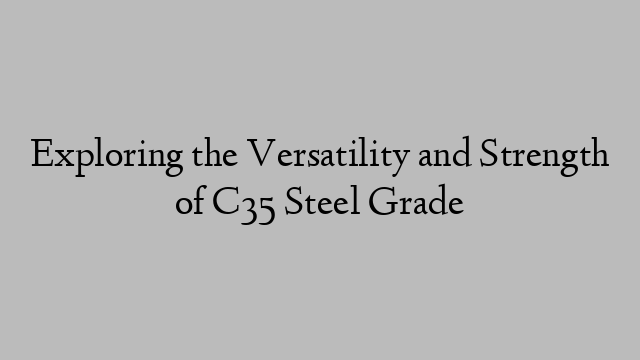Address
304 North Cardinal St.
Dorchester Center, MA 02124
Work Hours
Monday to Friday: 7AM - 7PM
Weekend: 10AM - 5PM
Address
304 North Cardinal St.
Dorchester Center, MA 02124
Work Hours
Monday to Friday: 7AM - 7PM
Weekend: 10AM - 5PM

1. Specification: Exploring the Versatility and Strength of C35 Steel Grade
C35 steel is a medium carbon steel grade with a nominal chemical composition of 0.32-0.39% carbon, 0.50-0.80% manganese, 0.04% phosphorus, and 0.04% sulfur. It also contains small amounts of other elements such as silicon, chromium, and nickel.
2. Mechanical Properties: Exploring the Versatility and Strength of C35 Steel Grade
The C35 steel grade exhibits a good balance of mechanical properties, making it suitable for a wide range of applications. Its strength and hardness can be enhanced through processes such as heat treatment.
– Tensile Strength: C35 steel has a maximum tensile strength of 550-800 MPa. This high strength makes it suitable for applications requiring structural stability under heavy loads.
– Yield Strength: The yield strength of C35 steel is about 360-580 MPa. This property determines the maximum stress a material can withstand before it starts to deform permanently.
– Elongation: C35 steel has a moderate elongation of 16-20%, indicating its ability to withstand plastic deformation before failure. This property allows it to be formed into various shapes and sizes.
– Impact Resistance: C35 steel exhibits good impact resistance, making it suitable for applications that require resistance to sudden shocks or impacts.
– Hardness: The hardness of C35 steel is typically in the range of 170-240 HB. This hardness level allows the material to resist wear and abrasion, increasing its durability.
3. Chemical Composition: Exploring the Versatility and Strength of C35 Steel Grade
The chemical composition of C35 steel plays a crucial role in determining its mechanical properties and overall strength.
– Carbon (C): Carbon is the primary alloying element in C35 steel and contributes to its strength and hardness. The carbon content in C35 steel ranges from 0.32-0.39%, providing a good balance of strength and weldability.
– Manganese (Mn): Manganese enhances the hardenability and tensile strength of C35 steel. The manganese content in C35 steel is typically 0.50-0.80%.
– Phosphorus (P) and Sulfur (S): These elements are impurities in C35 steel, with a maximum content of 0.04%. They affect the steel’s machinability and weldability and should be kept within specified limits.
– Silicon (Si): Silicon improves the strength and hardness of C35 steel and enhances its response to heat treatment. It typically has a small content in C35 steel.
– Chromium (Cr) and Nickel (Ni): These elements are present in trace amounts in C35 steel and contribute to the steel’s hardenability and corrosion resistance.
Overall, the chemical composition of C35 steel enables it to achieve a good balance of mechanical properties, making it suitable for various applications requiring medium carbon steel with moderate strength and hardness.
C35 Steel grade
1698514057